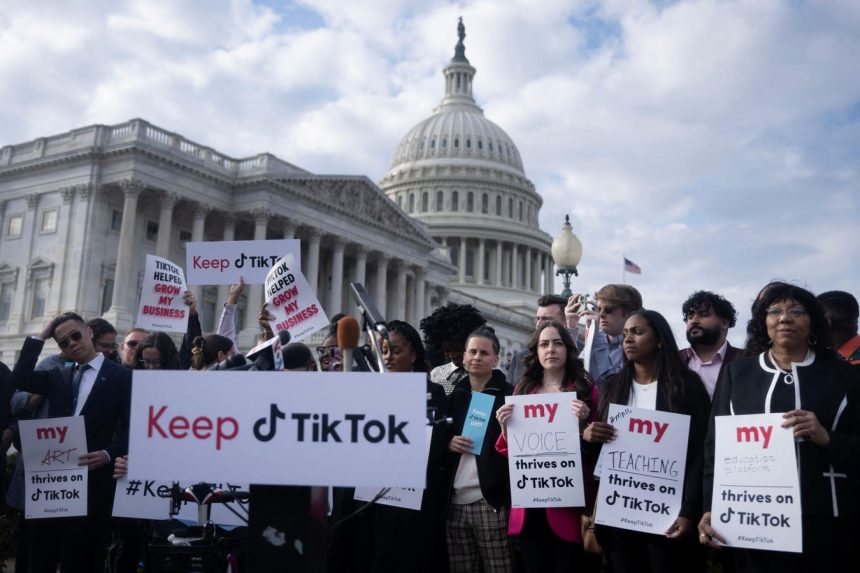The looming threat of a TikTok ban in the United States has left its massive user base of 170 million Americans in a state of uncertainty. The Supreme Court appears inclined to uphold a law mandating the sale of TikTok to a U.S. entity or its outright ban, leaving the platform’s future hanging in the balance. The justices expressed skepticism towards TikTok’s arguments that the law infringes upon its First Amendment rights, essentially signaling that divestment from its Chinese parent company, ByteDance, is the only path to survival in the American market. The ban, slated to take effect on January 19th, could have significant repercussions for content creators, users, and the social media landscape as a whole.
The potential ban stems from bipartisan concerns surrounding national security and data privacy, despite ByteDance’s repeated denials of any connection to the Chinese government. While the specifics of these national security concerns remain undisclosed, reports have emerged detailing instances of TikTok allegedly spying on journalists, promoting Chinese propaganda, and mishandling user data. These allegations have fueled the push for legislative action, culminating in President Joe Biden signing the bill into law in April. This action sparked a flurry of interest from potential American buyers, including industry giants like Amazon, Oracle, Walmart, and Microsoft. However, the sale process remains unresolved, leaving the platform vulnerable to the impending ban.
The immediate impact of the ban would be the prohibition of U.S. app stores and internet service providers from hosting TikTok. This would effectively halt new downloads and updates, rendering the app increasingly obsolete over time. While existing users could technically retain the app on their devices, the lack of updates would lead to decreased functionality, performance issues, and compatibility problems with evolving operating systems. Essentially, TikTok would gradually become unusable, forcing users to seek alternative platforms. This scenario would be devastating for content creators who rely on the platform for income, particularly those who benefit from TikTok’s creator fund programs. These creators would face a significant loss of revenue and potentially need to seek alternative employment.
While a VPN might offer a temporary workaround, allowing users to mask their location and potentially access TikTok through a web browser, the long-term viability of this solution is uncertain. The law aims to remove TikTok from internet browsers entirely, and even with a VPN, the app’s functionality would likely degrade over time due to the lack of updates. Moreover, the legal implications of circumventing the ban through a VPN remain unclear. Users concerned about losing access to their favorite TikTok videos are encouraged to proactively download them. This can be easily accomplished on desktop computers by right-clicking on public videos and selecting “Download video.” Mobile users can save videos by tapping the share button and choosing the “Save video” option. Third-party tools, like the Chrome extension myfaveTT, offer more comprehensive solutions for exporting liked and favorited videos.
The situation becomes even more complicated by the presence of Lemon8, a sister app to TikTok also developed by ByteDance. While some users have viewed Lemon8 as a potential alternative should TikTok be banned, the existing legislation applies to Lemon8 as well, potentially rendering it equally vulnerable to a ban. This leaves users with even fewer viable alternatives within the ByteDance ecosystem. Furthermore, the fate of U.S. user data remains a significant concern. While uncertain, there is a possibility that this data could be transferred to China, mirroring the situation that unfolded following TikTok’s ban in India in 2020. This prospect raises further questions about data privacy and security in the context of the ongoing geopolitical tensions.
The incoming Trump administration presents another layer of complexity to the situation. Despite previously supporting a TikTok ban, President-Elect Trump has recently reversed his stance, expressing opposition to the ban. However, should the Supreme Court uphold the law, Trump’s options for intervention are extremely limited. He could potentially impose a 90-day pause on the ban’s implementation if TikTok demonstrates concrete steps towards securing a new owner. However, without substantial evidence of such progress, any delay would likely face legal challenges. Ultimately, the fate of TikTok in the United States rests largely with the Supreme Court’s decision, leaving millions of users and content creators anxiously awaiting the outcome.



